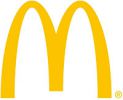First the bad news: Global sales for McDonald’s Corporation decreased 0.5% in October of 2014, compared to the same month last year. Systemwide revenues, which include franchisees as well as company-run restaurants, fell 3.4%.
Now the good news: The world’s largest quick service restaurant chain’s negative results were not as bad as estimates made by industry analysts, who were figuring on a 2.2% overall decline. Furthermore, systemwide sales were actually up 1.9% in constant currencies, and comparable sales were higher in Canada and Latin America for the Oak Brook, Illinois, USA-headquartered company, which operates over 35,000 outlets in more than 100 countries.
Peter Saleh, an analyst with the Telsey Advisory Group in New York, described October sales this way: “Very encouraging. The most encouraging, I would say is the US, where the traffic trend improved from September to October.”

Revenues in the United States were down 1% in an environment of strong competition from rivals Burger King, Wendy’s, Taco Bell and others.
Turnover in Europe slipped by 0.7%, while consolidated sales in the Asia/Pacific, Middle-East and Africa (APMEA) sector were down 4.2%. Consensus Metrix, a unit of the Wayne, New Jersey-based Kaul Advisory Group, had expected sales in Europe and Asia to fall 2% and 6.1%, respectively.
Don Thompson, president and chief executive officer of McDonald’s, announced that measures are being implemented to get things back on track. Among the initiatives are a revamped marketing approach, simplified menu and new organizational structure.
“Today’s consumers increasingly prefer customizable food options, dining in a contemporary, inviting atmosphere and using more convenient ways to order and pay for their meals,” stated the ceo. “Although October results reflect our current business challenges, we are moving with a sense of urgency to improve the trajectory of our financial performance while taking the actions necessary to pursue the brand’s long-term potential.”
McDonald’s has been testing a build-your-own-burger option in California, where customers are able to choose preferred toppings on a touch screen. It has also been gearing up mobile ordering options.
While charting a solid performance in the United Kingdom, overall results in Europe (which typically accounts for approximately 40% of total revenues) were disappointing due in no small part to weak sales in Russia. A number of restaurants have been temporarily closed for political reasons following economic sanctions slapped on Moscow by Western governments in the wake of Russia’s annexation of Crimea and its support of insurrection in eastern Ukraine. This, along with the significant weakening of the euro and Russian ruble, negatively impacted the region’s systemwide sales.
Sales in the two largest markets of the East Asian area of APMEA continue to be hurt by ongoing public relations problems stemming from food quality issues with a major supplier of poultry products to fast food restaurants in China and Japan. Same-store sales reportedly slumped 17% in Japan during October.
“The markets affected by the supplier issue are actively executing multi-faceted initiatives to restore customer trust in the McDonald’s brand, while the broader APMEA segment is pursuing long-term opportunities to drive customer traffic and loyalty with unique menu, affordability and convenience options,” stated a press release issued by McDonald’s on November 10.
No GM French Fries on Menu
Acting proactively to stave off what could potentially be another public relations crisis, McDonald’s has announced that it has not imported or sold genetically modified potato products at any of the 2,000-plus outlets its operates in the PRC.
In a November 11 story carried in the Beijing-headquartered Global Times, a tabloid newspaper published by the Communist Party’s People Daily, a McDonald’s spokesman was quoted as saying: “McDonald’s China does not use genetically modified potatoes. The potatoes used are in line with the national laws and regulations.”
 The article, which was distributed online as well as in print, was published following the US Department of Agriculture’s recent announcement that Boise, Idaho-headquartered J.R. Simplot Company may proceed to commercially plant the genetically engineered Innate potato in the United States. The tuber’s DNA [see related story at FrozenFoodsBiz.com website] has been altered so that less of the suspected carcinogen acrylamide is produced during the high-heat frying process required to make french fries and potato chips.
The article, which was distributed online as well as in print, was published following the US Department of Agriculture’s recent announcement that Boise, Idaho-headquartered J.R. Simplot Company may proceed to commercially plant the genetically engineered Innate potato in the United States. The tuber’s DNA [see related story at FrozenFoodsBiz.com website] has been altered so that less of the suspected carcinogen acrylamide is produced during the high-heat frying process required to make french fries and potato chips.
Simplot, one of the world’s largest producers of french fries in the world, supplies McDonald’s in China with frozen potato products. It has been on the scene in the PRC since 1990, having been the first foreign company to industrially pack french fries in the country, in cooperation with a joint venture partner, at the Beijing Simplot Food Processing Co. Ltd. facility in Nanyan. The operation was set up in a vegetable processing plant during the early days of the establishment of Western-style quick service restaurants in the China market.
China’s Ministry of Agriculture has strictly prohibited the sale of GM products and/or growing them in the PRC. At the same time, it is closely monitoring advances being made abroad in this evolving field of agri-technology.
The Global Times quoted Luo Yunbo, a GM food expert at the China Agricultural University, as saying that consumers should not be worried about eating genetically modified food.
“Many organizations, such as the Food and Drug Administration of the United States and the European Food Safety Authority, have stated that GM foods are safer to consume than normal food,” commented Luo.





